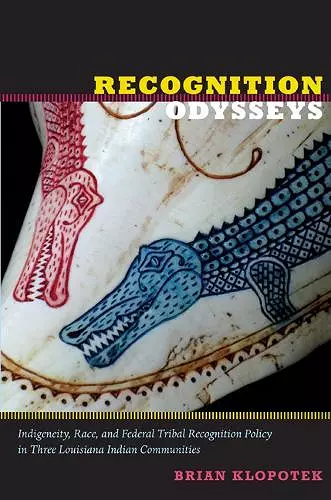Recognition Odysseys
Indigeneity, Race, and Federal Tribal Recognition Policy in Three Louisiana Indian Communities
Format:Hardback
Publisher:Duke University Press
Published:30th Mar '11
Currently unavailable, and unfortunately no date known when it will be back

The complex relationship between federal tribal recognition policy and American Indian racial and tribal identities
Compares the experiences of three central Louisiana Indian tribes with federal tribal recognition policy to illuminate the complex relationship between recognition policy and American Indian racial and tribal identities.In Recognition Odysseys, Brian Klopotek explores the complicated relationship between federal tribal recognition policy and American Indian racial and tribal identities. He does so by comparing the experiences of three central Louisiana tribes that have petitioned for federal acknowledgment: the Tunica-Biloxi Tribe (recognized in 1981), the Jena Band of Choctaws (recognized in 1995), and the Clifton-Choctaws (currently seeking recognition). Though recognition has acquired a transformational aura, seemingly able to lift tribes from poverty and cultural decay to wealth and revitalization, these three cases reveal a more complex reality.
Klopotek describes the varied effects of the recognition process on the social and political structures, community cohesion, cultural revitalization projects, identity, and economic health of each tribe. He emphasizes that recognition policy is not the only racial project affecting Louisiana tribes. For the Tunica-Biloxis, the Jena Band of Choctaws, and the Clifton-Choctaws, discourses around blackness and whiteness have shaped the boundaries of Indian identity in ways that have only begun to be explored. Klopotek urges scholars and officials from the Bureau of Indian Affairs (BIA) to acknowledge the multiple discourses and viewpoints influencing tribal identities. At the same time, he puts tribal recognition in broader perspective. Indigenous struggles began long before the BIA existed, and they will continue long after it renders any particular recognition decision.
“Carefully researched and impeccably argued, Recognition Odysseys illuminates the struggles, benefits, and pitfalls of federal recognition for American Indian tribes. Brian Klopotek bravely details the unrecognized history of anti-black racism in the agencies with power to confer federal recognition, and within the tribes themselves. Recognition Odysseys is a necessary book for American Indian studies, as well as for critical race scholars, tribes seeking recognition, and other peoples, such as Native Hawaiians, who are subject to similar processes.”—Noenoe K. Silva, author of Aloha Betrayed: Native Hawaiian Resistance to American Colonialism
“Engaging, lively, and based on superior scholarship, Recognition Odysseys is an important contribution to scholarship on the federal recognition process and the broader issue of how U.S. American Indians take on modern political and cultural identities. Brian Klopotek is clearly committed not only to the well-being of the communities he writes about, but also to confronting troubling truths about what it means for tribal peoples to participate in the world of recognition and federal Indian policy.”—Robert Warrior, Founding President of the Native American and Indigenous Studies Association
“[A] welcome addition to the growing body of literature concerning federal acknowledgement. This work… provide insights into the federal acknowledgement process, the shifting contexts of Indian identities, and the colonial legacy of the United States Indian law, which continues to hold ultimate authority over legitimizing who is Native and, ultimately, who is not.” -- Gregory R. Campbell * Canadian Journal of Native Studies *
“Klopotek demonstrates that the very process of attempting to gain recognition magnifies internal and external tensions that can threaten the maintenance of identity and culture. The book is written in such a way that this very personal and the human aspect is brought to light. Recommended. All readership levels.” -- J. S. Ashley * Choice *
“Klopotek, a self-described ‘non-federal Choctaw' with roots in Sabine Parish, Louisiana (p.16), has produced a remarkably empathetic, frank, to-the-point, and, on places, no-holds barred account of three Louisiana Indian communities going through the federal recognition process, and of the process itself. The three communities differ significantly (one is not yet entered into the official list of tribes), a fact that enables the author to reveal a range of consequences for tribes seeking recognition.... Of several recent books on the topic of recognition, this one is distinguished by the exploration of white supremacy and race in their relationships to indigeneity.” -- Bruce Granville Miller * Journal of Anthropological Research *
“With the publication of Recognition Odysseys, Brian Klopotek establishes himself as an emerging new star in the field of Native American Studies. Rarely have I encountered a first book that is so meticulously researched, powerfully argued, theoretically original, while also being accessible to a general reader…. With rich archival depth, poignant and carefully chosen interviews, as well as theoretical sophistication, the book is essential reading for scholars of Native North America and U.S. race relations, and anyone concerned with understanding the intersections of colonialism, racism, white supremacy, indigeneity and sovereignty.” -- Circe Sturm * International Journal of Critical Indigenous Studies *
"Brian Klopotek's richly documented historical and ethnographic book makes a major contribution and should appeal to scholars, advanced undergraduates, and graduate students…. Overall, in this impressive book Klopotek has presented careful and compelling case studies while also advancing broader scholarly conversation." -- Jessica R. Cattelino * Ethnohistory *
"Using a multidisciplinary approach combining history, anthropology, and sociology, Klopotek has written an immensely impressive and supremely complex history of three distinct Indian communities . . . Recognition Odysseys, in short, transforms our understanding of indigenous nation building and sovereignty." -- Robbie Ethridge * H-Law, H-Net Reviews *
ISBN: 9780822349693
Dimensions: unknown
Weight: 699g
404 pages